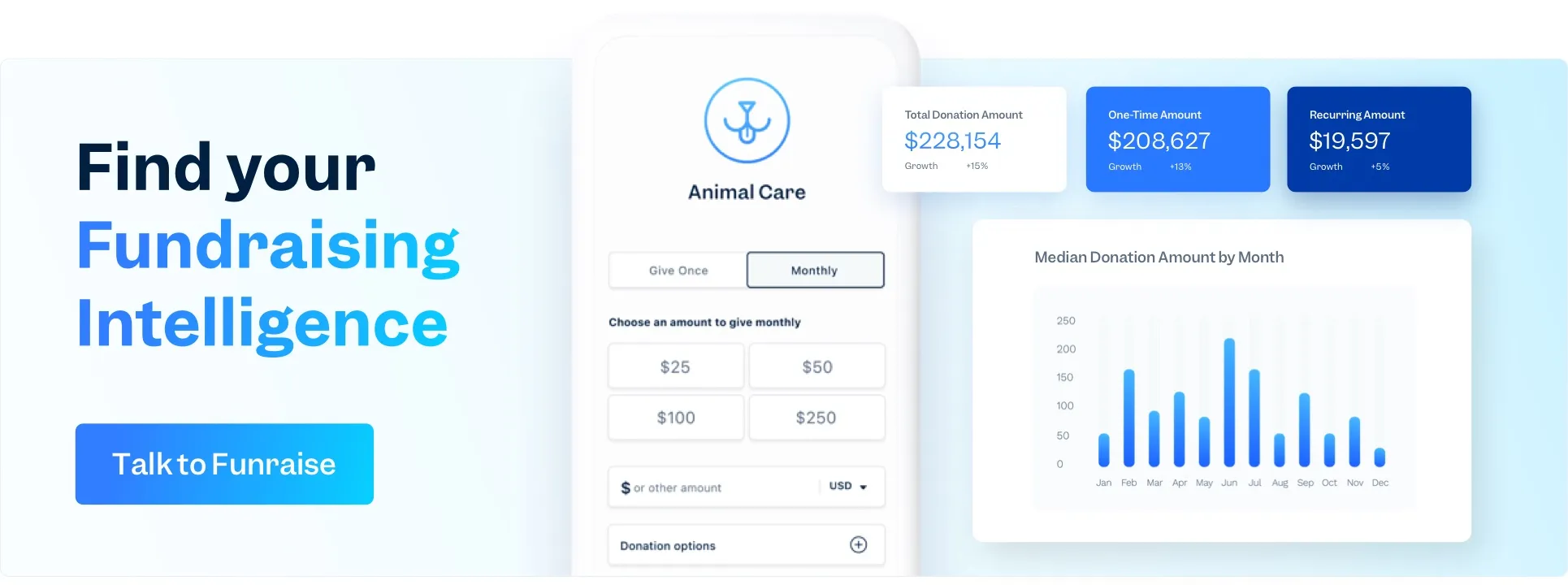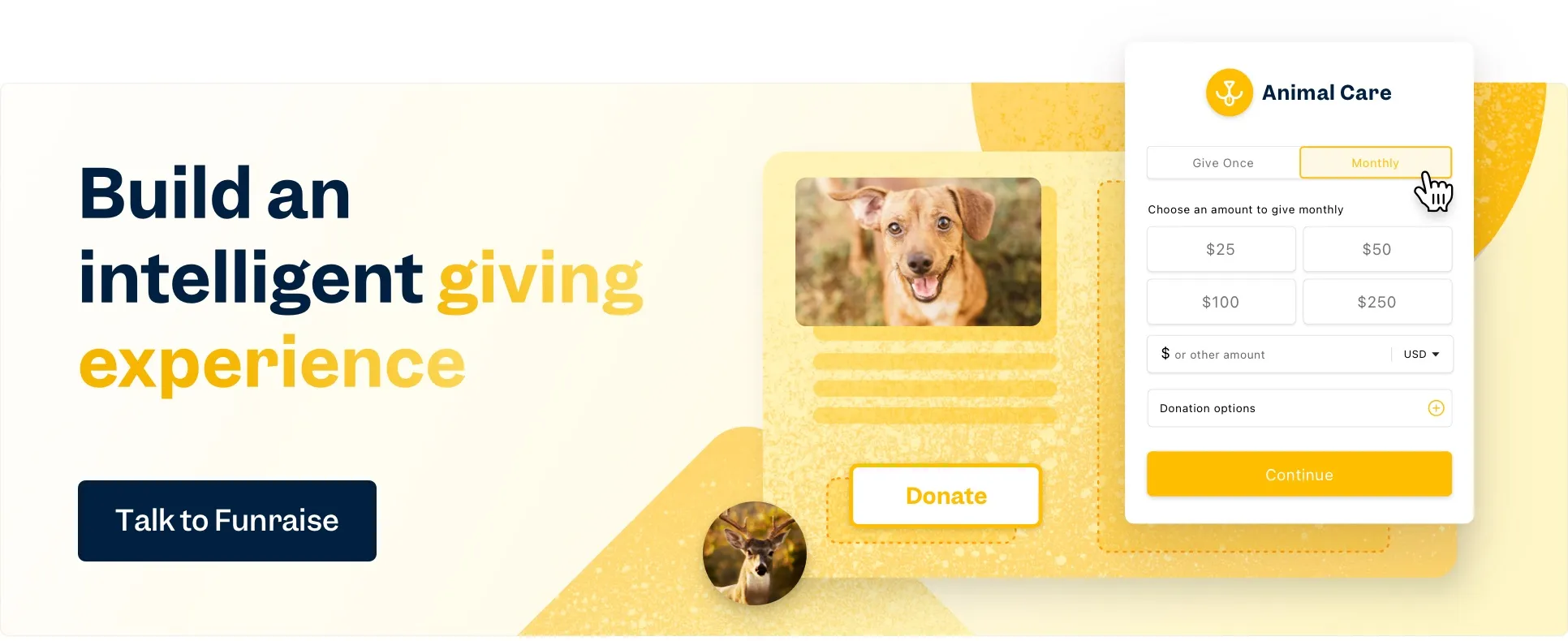When life feels hard and the entire world feels like one big Twitter war, it’s our shared humanity that gives us hope. And when we step back and focus on that oneness—that integral common thread—we are so much stronger and so much better. But to realize these grand aspirations for a brighter tomorrow, we need to start by protecting human rights all across the globe.
Human rights organizations fight for justice day in and day out. They spread awareness, lobby oppressive governments, and mobilize the masses. This type of work requires passion, determination, and innovation. And, it requires funding. That’s why we’re providing these world-changing, injustice-smashing fundraising ideas, examples, and tips.
If you’re ready for liberty and justice for all, for real, read on.
4 inspiring human rights-focused fundraising examples
Human rights fundraising doesn’t lend itself to fluffy events and cutesy social media campaigns–but it does create an opportunity to do a heck of a lot of good. Here are four examples of human rights fundraising campaigns that inspired us and empowered change.
1. Ending Wrongful Incarceration

Why We Love Them: The Innocence Project gets an A+ for nonprofit donor transparency! The organization features a comprehensive FAQ on their donation page, as well as the option for donors to host peer-to-peer fundraisers through personalizable independent donation pages.
2. Investing in Human Rights Innovators

Why We Love Them: Powered by a custom donation page, The Fund for Global and Human Rights seamlessly transforms donations into direct impact. Donors are given various methods of giving, opportunities to boost impact, and the option to choose which specific human rights projects their donations support.
3. Exposing Epidemics of Injustice

Why We Love Them: You can join RFK Human Rights in creating change by supporting urgent action funds. Donors can contribute through RFK Human Rights' custom donation page and choose from a litany of donation options including supporting issue-specific funds and even making stock donations!
4. Fighting for Refugee Freedom

What we love about it: With a broad menu of giving options, Liberty in North Korea leverages their custom donation pages to facilitate contributions toward life-saving programming. Through Funraise site integrations, LINK donors can give in a variety of ways, including corporate matching and stock donations!
17 powerful fundraising ideas for human rights nonprofits
Fundraising for human rights is complicated. You’re tackling emotional, politically complex issues that are changing in real time, and you want to engage with your donors in a way that’s authentic but hopeful. These fundraising ideas—and the accompanying social media examples—walk that fine line, balancing the serious nature of your cause with a celebratory spirit. They’ll rally your supporters, spread awareness, and, hopefully, spark a revolution.
1. Gratitude countdown
Democracy’s having a time of it these days, so wherever you’re living, chances are you’re feeling some angst. That makes it easy to forget that things are much worse elsewhere. A gratitude countdown, during which supporters share one thing or right that they’re grateful for every day of the month—and encourage their network to do the same—is a great way to spread positivity and spread the word.
Sample Social Media Copy: From owning a car to having clean water, and from ice cream to cat videos, we all have a lot to be thankful for. This month, join our gratitude countdown by sharing one thing you’re grateful for every single day. We’ll start: At [Organization Name], we’re grateful for all of you who spread the word and support human rights across the globe.
2. Phone bank bingo
A big part of fighting for human rights is spreading awareness and lobbying for crucial protections. And when it comes to shouting your cause from the rooftops, picking up the phone is majorly effective—if slightly stressful. But it doesn’t have to be that way! Make it fun by gamifying the experience. Make up bingo boards, give awards for the most awkward interaction, and set goals to encourage everyone to do their best.
3. Client panel
Putting a face to your work puts the “human” in “human rights.” Host a panel with clients who’ve benefited from your nonprofit’s work, including a live Q&A with audience members. Above all else, you need to ensure that your clients feel comfortable. One more note: if they ask to be compensated for their time, it’s up to you to make it happen.
4. Musical performance
Few things showcase humanity’s essence like music... making a musical performance an ideal human rights fundraising event. Whether it’s in-person or livestreamed, you can intersperse the performance with real photos of the people you’re helping to make for a memorable musical evening.
5. Campfire sing-along
Speaking of music, what could make everyone smile more than a sing-along around a campfire? This feel-good fundraiser is all about coming together and joining hands for freedom, peace, and human dignity. So print out the sheet music for “Simple Song of Freedom,” grab the fixings for s’mores, and raise your voice.
Sample Social Media Copy: Next weekend, raise your voice and raise funds for [Organization Name] at our campfire sing-along. We’ll bring the s’mores fixings and hot cider; you bring the spirit and the song.
6. Lunch and learn
From noon to one each month, host a monthly training or informational session related to your cause, reserving the last 30 minutes for respectful debate and discussion. If you want to make it really special (and up the entry fee), partner with a local restaurant to provide lunch each month, giving participants a couple of local pick-up options. Good for the soul and good for the stomach!
7. International Day for the Abolition of Slavery
December 2 marks the date that the General Assembly adopted the UN Convention for the Suppression of the Traffic in Persons and of the Exploitation of the Prostitution of Others. It’s a mouthful that marked a crucial turning point in the global fight to eradicate slavery, but today, 40 million people are still victims of forced labor, marriage, or human trafficking. Take this day to acknowledge the millions of Africans who suffered because of the transatlantic slave trade. Then, honor their resilience.
8. International art auction
If your nonprofit focuses on protecting rights abroad, an international art auction is an inspiring way to fundraise for your cause. Auction off art from the region you’re focused on and include a short artist bio with each piece. Art is how people express themselves, and by sharing it across cultures, we can better understand how they move through the world.
9. Documentary screening
Screen a documentary related to your cause, followed by a Q&A session. If you can get someone involved with the film to attend, you’ve got a sold-out event on your hands; if not, find someone who’s knowledgeable about the issue to stand in. And one more thing: no matter how serious the issue, don’t forget to sell snacks!
10. International Women’s Day
If you’re fighting for human rights, you’re fighting for women’s rights. On March 8th, we celebrate women’s achievements—and what better way to do that than to fundraise for equality and women’s empowerment?
Sample Social Media Copy: Happy #internationalwomensday! Today, don’t forget to show your appreciation for all the women in your life. And we have the perfect place to start: with a tribute gift to [Organization Name]. Every donation helps.
11. Tribute dinner
When it comes to human rights, some folks out there are really freaking amazing. They’re risking their own lives, on the ground, every single day—all to make a better world for their fellow human beings. Organize an inspiring (and delicious) dinner in honor of one of these heroes (that word’s gender-neutral nowadays, FYI).
12. Holocaust Memorial Day
Known as Yom HaShoah in Israel, Holocaust Memorial Day is a day to reflect on the millions of Jews and other marginalized people who were murdered during the Holocaust. Each April, it’s an opportunity to honor those who passed and those who survived with a vigil or community memorial quilt. If your organization is focused on combatting antisemitism, you can also use this day to celebrate Jewish culture.
13. Book club
There’s no shortage of excellent, illuminating books about human rights out there. With a members-only book club, you’ll cultivate community, expand horizons, and build a base of reliable monthly donors. And even if people don’t read the book—and we’ve all been there—they’ll still learn about an important issue and have a new topic to discuss at dinner parties.
14. Indigenous Peoples’ Day
We’re all in agreement that celebrating Columbus Day is overtly offensive at best. Instead, each October, we celebrate the contributions and culture of Indigenous peoples. If your organization supports Indigenous rights, host a cultural festival to raise awareness. If you support another group of people, highlight local tribes’ contributions and acknowledge the origins of the land around you. Then, direct your supporters to donate to Indigenous organizations. Oh, and one more thing: if your city’s still celebrating Columbus Day, make some calls to change that.
15. Digital Ambassador Program
Start a grassroots peer-to-peer fundraising movement with a digital ambassador program. Bring together on-the-ground activists and clients with passionate supporters to share breaking news, inspiring stories, and other curated content. Choose a catchy name, create a designated microsite (Funraise makes it easy!), and watch your community—and revenue—grow.
16. World Freedom Day
November 9 commemorates the fall of the Berlin Wall, but on World Freedom Day, we take a step back to appreciate all the freedoms that we so often take for granted. Donating to a favorite human rights charity (i.e., you) is the perfect way to celebrate.
17. Fake News Workshop
Across the web and on social media, false information abounds, and sometimes, it’s hard to recognize it. Host a workshop to teach your supporters how to identify fake news, with an emphasis on the importance of supporting trustworthy journalism. This is also a great event for teenagers to attend. Start building the skills to cite credible sources as early as possible!
5 effective tips for human rights fundraising
Human rights organizations rarely get the funding needed to support their life-changing work. Plus, many don’t accept government or corporate funding because they want to stay completely independent. This makes community-based fundraising all the more important. Here are some tips to up your fundraising game and work toward a better world a bit more quickly.
- Connect your fundraising efforts to the real people you’re helping. Share their stories, feature their photos, and amplify their voices. They’re the heart of everything you do.
- Don’t overdo the urgency. In human rights, almost everything is urgent. But supporters will quickly get drained by endless crises. Instead, save that language for when it really matters and focus on the day-to-day issues—and the progress you’re making.
- Human rights goes hand-in-hand with peer-to-peer fundraising. That connection, that community, is what you’re fighting for, so focus on events that bring your supporters, staff, clients, and the larger community together to make a change.
- In the world of human rights, things change rapidly. If you’re fundraising for an issue that’s changing by the hour, create a designated microsite where supporters can stay up to date on the latest news. If that sounds like a lot of work, fear not: Funraise can hook you up in minutes.
- Balance spreading awareness with raising funds. Without a reliable source of information, many acts of oppression go unseen and unknown. Before you can start a movement, you need to shine a light on the issues, so increasing awareness is vital.
Benefits of human rights fundraising events
While human rights fundraising can be difficult, it’s vital. If you're feeling discouraged, we see you—and we want to remind you why you do this hard work. In addition to raising funds to support your work, here are some benefits of human rights fundraising events.
- Put faces to the names. In the end, everything you’re doing is for your fellow people, but that core goal can often get lost among hundreds of fundraising emails. Human rights fundraising events let you make that powerful person-to-person connection.
- Get no-strings-attached funding. Many human rights organizations are reliant on independent funding sources, which can add an extra hurdle to fundraising efforts. Fundraising events are a great way to solicit donations from independent donors.
- Spread awareness. A big part of the human rights fight is making people aware of what’s going on out there. At an event, and in the event communications, you can spread the word far and wide.
- Do more with little effort. Once you’ve gathered your supporters and updated them on all the latest, they can go out and spread the word to their networks. That means each fundraising event has the potential to bring even more awareness to your cause.
- Foster a community. People helping people is what human rights is all about, making a fundraising event the perfect way to cultivate a community of like-minded, like-hearted individuals who feel deeply connected to your cause.
- Showcase the wins. In the world of human rights, it’s easy to get discouraged. But at your events, you have an opportunity to show how you—and your supporters—are making a difference, even when times are difficult. That engenders loyalty and hope.
Human rights fundraising is challenging, but for every dollar raised, you’re fighting oppression, taking a stand, and changing lives. Whether you’re protecting children’s rights, fighting for economic justice, or defending free speech, we’re right here with you.
Human rights fundraising ideas: key takeaways
- Human rights are the inherent rights of all people, regardless of race, sex, nationality, ethnicity, age, religion, gender identity, or any other attributes.
- Human rights groups work to protect free speech, children’s rights, women’s rights, LGBTQ+ rights, and disability rights, among many other causes.
- Many human rights organizations refuse corporate or government funding to stay neutral, which makes community support through fundraising even more important.
- A lot of human rights work is around building awareness, investigating human rights abuses, and exposing human rights violations.































.webp)
.webp)











.webp)
.webp)

.webp)
.webp)
.webp)




